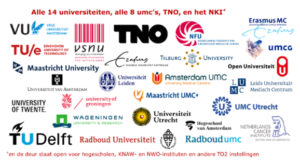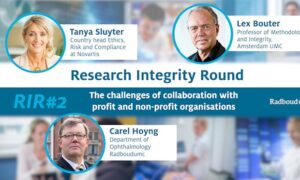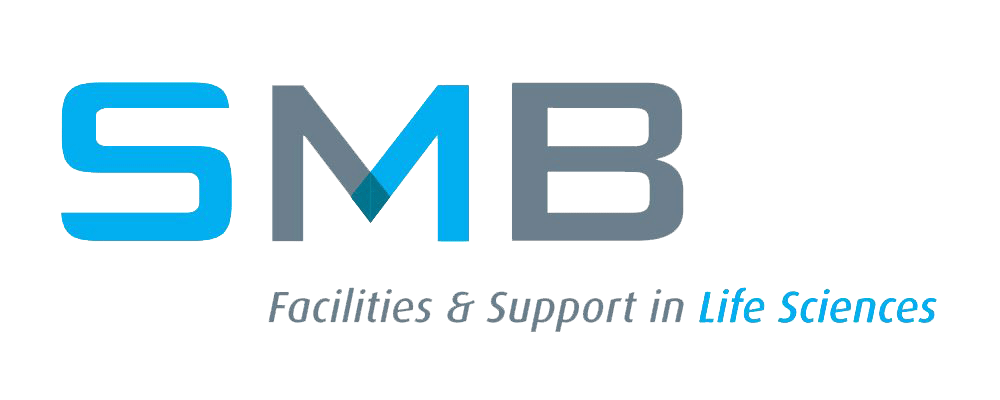Kennisinstellingen komen met nieuw plan om impact te vergroten
Nederland moet de Valorisatie-hotspot van Europa worden. Deze ambitie hebben de Nederlandse universiteiten, universitair medisch centra en TNO. Samen lanceren de kennisinstellingen op 1 november een plan om het nationaal valorisatie-ecosysteem te versterken. Het doel: in 2030 een valorisatiesysteem dat tot de absolute wereldtop behoort. VSNU-voorzitter Pieter Duisenberg: “De samenleving, het bedrijfsleven, studenten en wetenschappers willen steeds vaker wetenschappelijke kennis in de praktijk brengen. Het huidige ecosysteem voor deze valorisatie is te klein om die vraag aan te kunnen. Daarom zetten we samen de volgende stap zodat investeringen in kennis en innovatie nog meer opleveren voor Nederland.”
Kennis en innovatie als antwoord op de maatschappelijke uitdagingen
De maatschappelijke uitdagingen waar Nederland, Europa en de wereld voor staan kunnen niet opgelost worden zonder wetenschappelijke kennis en innovatie. Een sterk nationaal valorisatie-ecosysteem versnelt het in de praktijk brengen van de oplossingen die de wetenschap biedt. Iedere euro die de overheid investeert in kennis en innovatie levert vier euro op. Dat gaat niet vanzelf. Een sterk valorisatie-ecosysteem waarin kennisinstellingen en het bedrijfsleven intensief samenwerken, zorgt dat wetenschappelijke kennis daadwerkelijk en snel gebruikt kan worden voor onze toekomst.
Naar een valorisatie-ecosysteem met een stevig fundament
Met de juiste keuzes kan Nederland in de tweede helft van het decennium niet alleen tot de Europese top behoren, maar zelfs dé valorisatie-hotspot van Europa worden. Margriet Schneider, voorzitter NFU: “In 2030 moet Nederland een nationaal valorisatie-ecosysteem hebben dat zich kan meten met de wereldtop. Doordat Nederland een relatief klein land is met een centrale ligging, wetenschap van wereldklasse en een uitstekende infrastructuur, hebben wij een enorme potentie. Die potentie willen we verzilveren.” De Nederlandse kennisinstellingen stellen de volgende drie doelen voor om in 2030 de valorisatie-hotspot van Europa te worden:
1. Een landelijk Knowledge Transfer (KT) systeem van wereldklasse. De Knowledge Transfer Offices (KTO’s), die wetenschappers ondersteunen bij valorisatie gaan internationale best practices in kaart brengen en in Nederland invoeren. In het landelijke KT-systeem werken kennisinstellingen samen aan expertise, opleiding en training en maken zij een heldere taakverdeling om maatschappelijk uitdagingen rond bijvoorbeeld veiligheid, zorg en duurzaamheid effectief aan te pakken.
2. Samenwerking binnen het ecosysteem versterken. Intensievere samenwerking tussen kennisinstellingen, investeerders en bedrijven om startups te ondersteunen, met uniforme richtlijnen over intellectueel eigendom.
3. Samen gericht uitbreiden van de KTO-capaciteit. Versterken van de ondernemende cultuur binnen de wetenschap en, met alle kennisinstellingen gezamenlijk, het screenen, scouten en ondersteunen van spin-outs op basis van valoriseerbare kennis.
Uiteindelijk zorgen deze acties niet alleen voor een beter valorisatie-ecosysteem. Het verbetert het vestigingsklimaat van Nederland, maakt ons land aantrekkelijker voor ondernemend en onderzoekend talent én bestaande investeringen zoals het Nationaal Groeifonds krijgen een grotere impact.
Hoe nu verder
In het vandaag gepresenteerde plan stellen VSNU, NFU en TO2 een 7-jarige regeling voor. In deze periode kan de bestaande basis verder worden uitgebouwd. Allereerst zal worden nagegaan welke concrete versterkingen, kwaliteitsimpulsen en interventies nodig zijn. Tegelijkertijd worden kennisinstellingen, regio’s en partners gevraagd hun valorisatieambities concreet te maken. De komende jaren zullen de VSNU, NFU en TO2 volgens het plan jaarlijks de activiteiten en resultaten van het valorisatie-ecosysteem monitoren en daarover rapporteren. Maandag 1 november wordt het plan aangeboden aan Focco Vijselaar, directeur-generaal Bedrijfsleven en Innovatie van het ministerie van Economische Zaken en Klimaat.





